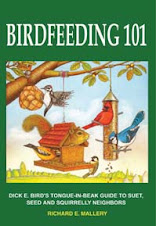
Limitless in bounds,
Yet strikingly it hastens
Without the slightest sound.
A drift in time is never more
Than what you have at hand,
So capture all its glory
You never know what’s planned.
The quickest move the mind can make
Is slow compared to death.
The hawk can take the sparrow
In the ebbing of a breath.
So live as though the hand of time
Could tap you any season,
Fear not the hawk that circles life
For respite there is reason.
—Dick E. Bird

Am I the Pell, Peel or Pie-leated Woodpecker?
It doesn’t matter what my name,
But who I’m going to be;
As long as I can have my pride,
And whack away at trees.
You can call me Woody,Pilly, Pie, or Pea;
Just put a bunch of suet out,
And that is where I’ll be.
--Dick E. Bird
Do birds communicate with one another?
It is quite obvious that birds communicate with each other, but a total understanding of their communication skills is far from complete. They communicate the same way we do by sound, movement, facial gesture and actions. Your spouse does not have to actually yell at you to communicate dissatisfaction. The eyes can tell a story, bared teeth, beet red skin condition, hair standing on end. If I were you I would get out there and fill the birdfeeder right now!
Birds have calls, they flush, they fight, they pound, they bob and weave, charge and retreat, dance and feign injury. Each species has its unique combinations of sound. The relation that varied species have to each other’s sounds is not clear, but I can tell you this, when a hawk speaks, songbirds at my feeder listen.
How does a bird learn to build a nest?
It is very simple actually. They learn the same way a spider learns to spin a web and a bee learns how to build a hive. It is a form of higher education called instinct. If species did not have instinct, they would be extinct. Most nests are so intricate, and birds have such short life spans, that if birds had to learn how to build they would be too old to reproduce before they had the knowledge to build a love nest. This is the ornithological theory known as "Too soon old—too late wise." The old saying, "You are what you eat," does not always apply to birds in appearance and behavior. For birds "You are if you haven’t been eaten." Nest building in varied species has evolved into a fine-tuned practice in a changing environment. Studies are showing that even the changes and new forced practices of nest building are being passed on in instinctive behavior. Birds have a building code so precisely and genetically monitored that there is no need for a building inspector.
Do birds dream?
All birds dream of a healthier environment. Ornithologists call this a "pipe-dream." Only part of the bird’s dream. Now you’re saying, "He just said all birds dream!" You are absolutely right. I did say that, but what I say and what I mean are two entirely different things. Birds sleep very lightly. Their bodies relax but their little bird brains keep right on ticking. The daily management part of the brain is often asleep. This is true for most management. The unconscious part of the mind (the part you take to work with you) continues to function. It conjures up visual images of things you and no birds could ever accomplish, and produces dreams. Many birds dream of eating cats, spraying pesticides in peoples’ refrigerators, making people eat off dirty tables, giant oil spills in bathtubs, and netting and banding unsuspecting humans to see just where it is they go in the winter.
Do birds help flowers communicate?
The jury is still out on this one. Even though there is no evidence that flowers respond to human communication, there are many who contend that plants respond to human communication. If that were true then they probably respond to bird communication also. It only makes sense. In the spring when the birds start singing—the flowers start growing. Hummingbirds will come along and whisper in the ear of a trumpet vine—and before you know it, they are spreading rumors all over the yard. There is no scientific confirmation that soothing music has a beneficial effect on plants, but again it only makes sense when we see the effect a little birdsong has on them. Happy birds mean happy flowers, and happy flowers produce abundant amounts of nectar. Flitting bees flirt with nectar-producing flowers then buzz back to the hive and manufacture honey. While all this is going on, there is a quiet little communication going on called pollination, and that makes more birds sing, more flowers grow and more bees busy. And honey—that’s no lie.








